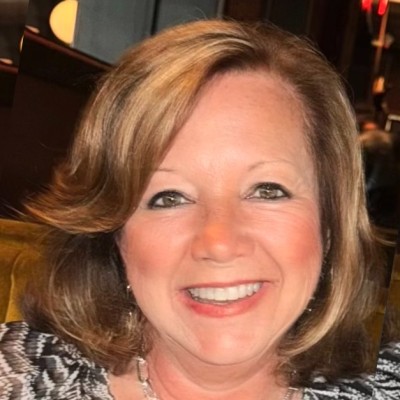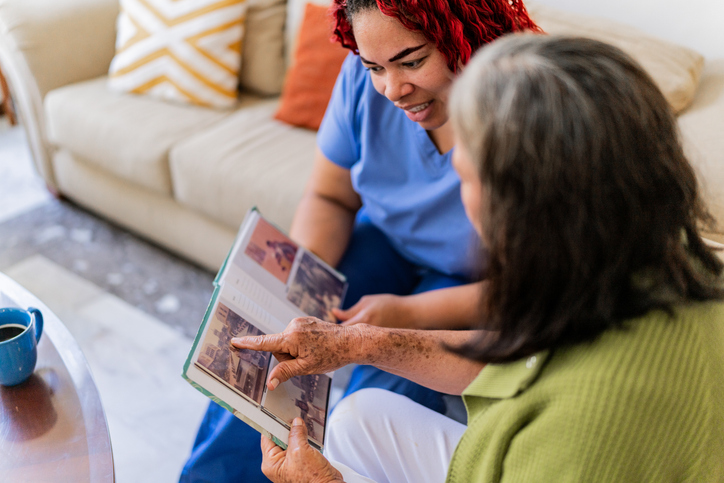 Navigating the challenges of dementia can be an emotional and complex journey—for patients and their loved ones alike. At Riverside Healthcare’s Senior Life, memory care services are thoughtfully designed to provide compassionate, person-centered support that prioritizes dignity, safety, and quality of life.
Navigating the challenges of dementia can be an emotional and complex journey—for patients and their loved ones alike. At Riverside Healthcare’s Senior Life, memory care services are thoughtfully designed to provide compassionate, person-centered support that prioritizes dignity, safety, and quality of life.
Through specialized programs, a highly trained team, and a calming, secure environment, Riverside empowers individuals living with dementia to experience meaningful moments while offering families the peace of mind that their loved ones are in caring, capable hands. Here, Cindy DeGroot, Senior Life Learning Coordinator and Certified Dementia Practitioner, offers helpful information for patients and their families. First, it’s important to understand the intricacies surrounding memory issues.
Is Alzheimer's the Same as Dementia?
Dementia is a broad, umbrella term used to describe a range of symptoms that affect memory, thinking, and reasoning. Alzheimer's disease is the most common type of dementia, accounting for the majority of cases. First identified by Dr. Alois Alzheimer in 1906, Alzheimer’s is a progressive condition that worsens over time and is not a normal part of aging.
Who Is Most at Risk for Alzheimer's Disease?
While scientists don't yet fully understand what causes nerve cell failure in Alzheimer’s disease, they have identified several key risk factors. Age is the greatest known risk—after age 65, the likelihood of developing Alzheimer’s doubles every five years, with about one-third of people over 85 affected.
Family history also plays a role; individuals with a parent or sibling who has Alzheimer’s are at greater risk. Additionally, research shows that Hispanic and Black older adults are more likely to develop the disease, possibly due to higher rates of cardiovascular issues.
“More women than men are affected because women live longer than men, making it more likely for them to develop the disease,” notes DeGroot.
Recognizing the Warning Signs of Dementia
One of the most important things individuals can do is educate themselves about Alzheimer’s disease—what to look for and how to prepare. While occasional forgetfulness is a normal part of aging, Alzheimer’s involves more serious and consistent disruptions, such as forgetting recently learned information or struggling with short-term memory.
For example, warning signs include difficulty planning or solving problems, trouble completing familiar tasks, confusion about time or place, and vision or spatial challenges beyond typical aging. Language issues may also arise. “Sometimes, they have new problems with words or with speaking, stopping in the middle of a conversation and remarking, ‘What was I going to say? I don't know what to say next,’ and they can't continue,” explains DeGroot.
Additional signs of Alzheimer’s may include a noticeable decline in personal hygiene and self-care, withdrawal from hobbies or social activities once enjoyed, and significant mood or behavior changes. Individuals may become confused, suspicious, easily frustrated, or upset. These changes often interfere with daily routines and overall functioning.
Strategies to Promote Brain Health
A new initiative launched by the Alzheimer’s Association, IDPH, and other partners—highlighted at YourBrainWillThankYou.com—aims to raise awareness about brain health and promote dementia-friendly communities across Illinois, where over 260,000 people are living with dementia. The campaign emphasizes that "your brain health is in your hands," encouraging individuals to take proactive steps to reduce their risk.
Key lifestyle factors include managing chronic conditions like diabetes and high blood pressure, exercising regularly, eating a heart-healthy diet, avoiding tobacco and excess alcohol, and prioritizing quality sleep. “Sleep is really huge with this initiative. They say people should get seven to nine hours a night. However, we know our sleep patterns change as we age. And, we have to think about things like electronic devices. How many people lay in bed either watching TV or scroll their cell phone? That’s not conducive to proper sleep,” cautions DeGroot.
Support for Caregivers
Support for caregivers has long been a critical need in the community. Originally starting with a group called Children with Aging Parents in the 1980s, DeGroot now leads an Alzheimer’s support group to meet the growing demand. According to recent data from the Alzheimer’s Association, nearly 12 million Americans provide unpaid care for loved ones with Alzheimer’s or other dementias—contributing over 19 billion hours of care, valued at approximately $413 billion.
Most caregivers support their loved ones at home for as long as possible, often due to financial considerations. Given that Alzheimer’s can last anywhere from two to 20 years, education and access to local resources are essential for caregivers navigating this long and complex journey. DeGroot also advises caregivers to reach out when things get rough.
“Ask for help. It's okay. You shouldn't go on this journey alone. Sometimes you're the only care partner for that loved one, and you're there twenty-four hours, seven days a week. Partner with your primary care provider, ask them about community resources,” she urges. “We have local food delivery programs that could be beneficial. Local support groups. We are now up to four in the community that are offered with different agencies. When we get calls, I always encourage them to attend one that is convenient for them, on a day and at a time of day that’s best.”
Exploring Your Options and Next Steps
At Riverside Senior Life, supporting families through the dementia journey starts with a simple phone call. Staff, including the social worker and care team, regularly answer questions from families unsure of where to begin. Riverside offers guidance, connection to resources, and encourages participation in its Alzheimer’s support group, held on the second Tuesday of each month. Upcoming sessions will feature community partners like MCA Adult Day Center and Catholic Charities.
Riverside also provides respite care services, giving caregivers short-term relief and peace of mind. In some cases, a respite stay becomes a more permanent solution, offering a smooth and supportive transition for both patients and families.
“We always have tours if you just don't know what this type of care is all about. And, it's a really good idea to plan ahead,” suggests DeGroot. “Mom or dad might still be navigating okay at home and nothing major has happened, but you'd rather make the decision and check out communities prior to a catastrophic event that forces you to make that decision on the spot. That way, you've spoken with staff, you've toured, you've observed, and you have a better feeling about making those decisions. Remember, we're always just a phone call away."
Individuals can contact a Riverside Senior Life Marketing and Sales Coordinator at 815-935-3273. There’s also the option to get more information at www.riversideseniorlife.com.

